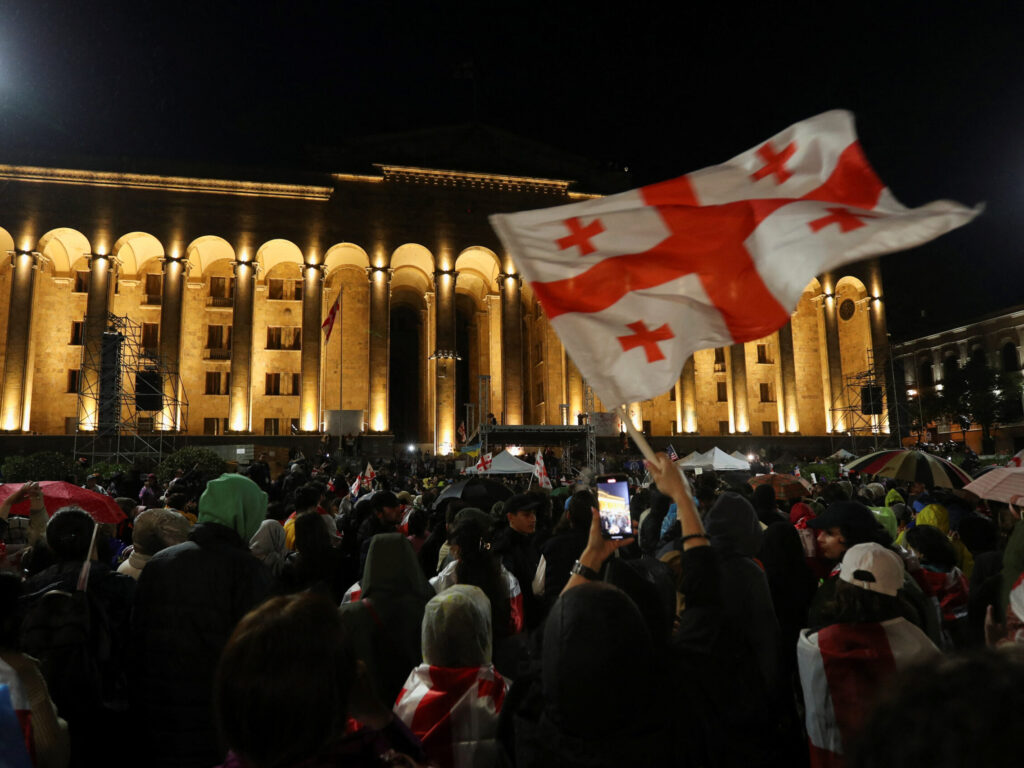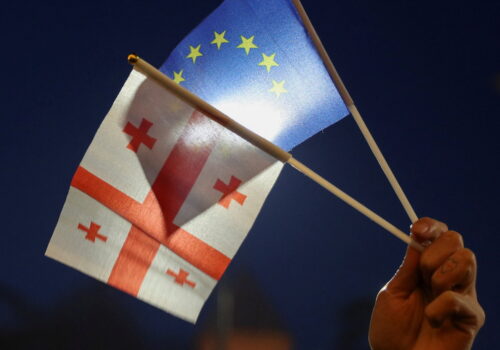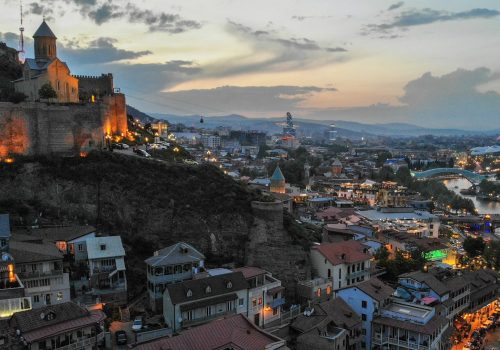On May 14, the Georgian parliament passed a controversial “foreign agent” law during its third and final hearing. The legislation would require organizations receiving more than 20 percent of their funding from other countries to register as “organizations serving the interests of a foreign power.” The bill has prompted fierce backlash from critics who argue that it is intended to crack down on opposition to the ruling party and align Georgia closer to Russia and away from the West. President Salome Zurabishvili plans on vetoing the bill, but the parliament can override her veto. Large, ongoing protests in Tbilisi have revealed how unpopular this foreign agent legislation is. So, why is the ruling Georgian Dream party still pushing it forward? And how should the West respond if the bill passes into law?
Electoral advantage
Georgian Dream stands to benefit from the adoption of the foreign agent law ahead of parliamentary elections in October. Civil society in Georgia has historically exerted a significant influence on the country’s politics. For example, it played a pivotal role in the 2012 elections by contributing to voter education and election monitoring.
However, the main vulnerability that Georgian nongovernmental organizations (NGOs) and civil society organizations face is financial reliance on international donors. Civil society organizations in Georgia receive more than 90 percent of funding from foreign sources, according to a 2020 report. Targeting their funding streams right before the elections seems to be a logical step for a ruling party that intends to eliminate influential and potentially opposing voices before the elections.
But many argue that Georgian Dream could win the October parliamentary elections without this legislation. After all, the ruling party is ahead in the polls and there have been reports that Georgian Dream has been leveraging administrative power to influence the elections. Extreme divisions have made it almost impossible for the Georgian opposition parties to form a coalition that could counter Georgian Dream. If anything, by introducing the foreign agent bill, Georgian Dream has united the opposition as well as the broader population in defense of Georgia’s European future.
Why, then, did Georgian Dream decide to move forward with this unpopular bill, knowing all too well it would trigger protests and antigovernment narratives just a few months before the elections?
Ivanishvili’s influence
Bidzina Ivanishvili, the richest man in Georgia and the founder and honorary chairman of Georgian Dream, could be key to understanding why the party took this self-destructive step. He exerts exceptional influence on the government’s decisions and actions.
Ivanishvili delivered a speech on April 29, during which he defined NGOs as agents nurtured by a global force that, in his telling, is responsible for getting Georgia and Ukraine into wars with Russia. He believes that the introduction of the foreign agent law ahead of the elections was necessary because NGOs were trying to change electoral laws, acting in the interest of the “global party of war,” which, he believes, intends to engineer a revolution in Georgia.
The combination of Ivanishvili’s views and a ruling party that executes his every decision with no questions asked is putting the Georgian people’s safety and future at risk. A sensible and nuanced Western response is needed to support the Georgian people.
The regional trend
The adoption of the Russian-style foreign agent law seems to be a regional trend, not just a Georgian phenomenon. Hungary, Kyrgyzstan, and Georgia all started actively pushing for foreign agent laws in 2023. Hungary implemented foreign agent legislation in December 2023, and Kyrgyzstan adopted its own in April 2024.
Three states in Eastern Europe and Eurasia pushing to adopt Russian-style foreign agent laws almost at the same time might not be a coincidence. It is possible Russia is inspiring or even pressuring the ruling parties. After all, Moscow’s influence in these countries would likely increase if the NGOs and civil society organizations in these countries were to lose funding from international donors.
Kremlin spokesperson Dmitry Peskov has defended Georgian Dream’s reintroduction of the foreign agent law and stated that it is in Moscow’s interests that the situation in Georgia is “stable and predictable.” Russian President Vladimir Putin has also reaffirmed ties with Hungary’s nationalist Prime Minister Viktor Orbán and claimed that Russian-Kyrgyz relations are developing in all directions.
The European Union (EU) has already launched legal action against Hungary in response to the introduction of this law. But Georgia and Kyrgyzstan are not EU member states, and so the same legal route is not available.
What the West should and should not do
It is crucial for the international community—especially the EU, the United States, and the United Kingdom—to support the will of the Georgian people. This means aiding Georgia’s pro-European president in her challenge to the ruling party’s actions. It also means seeking accountability for the ruling class that defies the will of its people and is impeding Georgia’s Euro-Atlantic integration, a goal that is written into Georgia’s constitution.
The EU should reconsider measures that could harm the Georgian population, such as the potential suspension of current visa-free travel. It would not help the situation to punish the wider Georgian population for the ruling party’s actions.
The international community and donors must continue their support for civil society organizations in Georgia, especially in the lead-up to the October elections. Despite the legal ramifications of the new bill and the anticipated crackdown on the civil society sector, sustaining funding streams is crucial for bolstering civil society’s monitoring capacity. This is vital for ensuring transparent and fair electoral processes in October and providing Georgia with an opportunity for another peaceful transition of power.
The many EU and Georgian flags carried through the streets of Tbilisi in recent weeks make clear where most Georgians’ view their future. The West must do what it can to help keep them headed in that direction.
Maia Nikoladze is the assistant director at the Economic Statecraft Initiative within the Atlantic Council’s GeoEconomics Center. Follow her at @Mai_Nikoladze.
Ana Lejava is a policy associate at the Georgetown Institute for Women, Peace and Security and a former Young Ambassador of Georgia to the United States. Follow her at @AnaLejava.
Further reading
Mon, May 6, 2024
Dispatch from Tbilisi: Amid Georgia’s battle for democracy, Russian influence is already here
New Atlanticist By Eto Buziashvili
The West has criticized Georgia's “foreign agent” law. Now it must take action to help defend democracy and the rule of law in Georgia.
Tue, Apr 9, 2024
Georgia launches new push to adopt Russian-style foreign agent law
UkraineAlert By Mercedes Sapuppo
Georgia’s ruling party has revived plans to pass legislation tightening restrictions on civil society, despite the fact that the same draft law sparked mass protests just one year ago, writes Mercedes Sapuppo.
Mon, Apr 19, 2021
Fighting for the hearts and minds of Sakartvelo: The Georgian information environment during the 2020 parliamentary election
Report By Eto Buziashvili, Givi Gigitashvili, Sopo Gelava, Graham Brookie, Andy Carvin, Iain Robertson, Zarine Kharazian
A technical analysis of how various online actors, both foreign and domestic, attempted to manipulate public opinion and influence the recent Georgian parliamentary election results.
Image: Demonstrators hold a rally to protest against a bill on "foreign agents", near Georgian Parliament building, in Tbilisi, Georgia, May 13, 2024. REUTERS/Irakli Gedenidze



